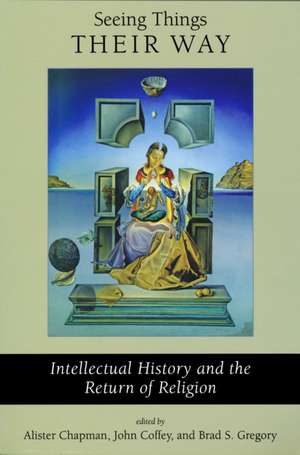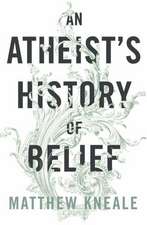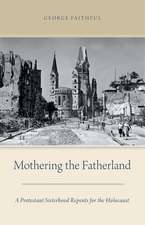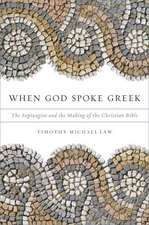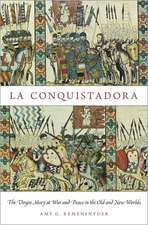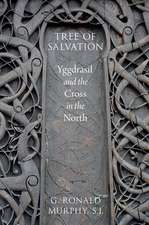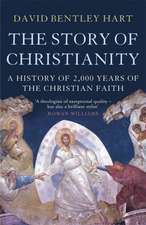Seeing Things Their Way – Intellectual History and the Return of Religion
Autor Alister Chapman, John Coffey, Brad S. Gregoryen Limba Engleză Paperback – 14 oct 2009
While religious history and intellectual history are both active, dynamic fields of contemporary historical inquiry, historians of ideas and historians of religion have too often paid little attention to one another's work. The intellectual historian Quentin Skinner urged scholars to attend to the contexts as well as the texts of authors, in order to 'see things their way.' Where religion is concerned, however, historians have often failed to heed this good advice; this book helps to remedy that failure. The editors and contributors urge intellectual historians to explore the religious dimensions of ideas and at the same time commend the methods of intellectual history to historians of religion.
The introduction is followed by an essay by Brad Gregory reflecting on issues related to the study of the history of religious ideas. Subsequent essays by John Coffey, Anna Sapir Abulafia, Howard Hotson, Richard A. Muller, and Willem J. van Asselt explore the importance of religion in the intellectual history of Great Britain and Europe in the medieval and early modern periods. James Bradley shifts forward with his essay on religious ideas in Enlightenment England. Mark Noll and Alister Chapman deal respectively with British influence on the writing of religious history in America and with the relationship between intellectual history and religion in modern Britain. David Bebbington provides a concluding reflection on the challenges inherent in restoring the centrality of religion to intellectual history.
"This terrific collection of essays will give all intellectual historians a lot to think about. With learning, courtesy, and precision, the authors make clear that historians of early modern and modern thought, in Britain, Europe, and America, need to pay far more attention than they have to religious ideas and categories. At the same time, though, they show that historians of ideas can provide historians of theology with important methodological lessons." --Anthony Grafton, Princeton University
"Seeing Things Their Way is a unique and important volume that explores and applies in the field of religious thought the methodology of intellectual history pioneered by Quentin Skinner. This rich interdisciplinary collection not only addresses for the first time at book length the strengths, weaknesses, and implications of this approach within the context of the history of religious ideas, but also offers some exemplary exercises in the good practice of that art. It will appeal to historians of political thought and specialists in intellectual history as well as to scholars interested in the place and treatment of religious ideas in social history." --Richard Rex, Queens' College, University of Cambridge
"There is no greater service that the historian can provide to our own understanding of ourselves in time and place than to reconstruct how past societies understood themselves in time and place. When historians fail to include a clear analysis of how the most articulate of our forebears struggled to locate God and his immanence into their studies of themselves and the societies they sought to build, those same historians impoverish our understanding of how our pasts inform our present and how and at what cost (if any) we exclude God from our sense of what makes a just society. This book teaches us that, and much more." --John Morrill, University of Cambridge
The introduction is followed by an essay by Brad Gregory reflecting on issues related to the study of the history of religious ideas. Subsequent essays by John Coffey, Anna Sapir Abulafia, Howard Hotson, Richard A. Muller, and Willem J. van Asselt explore the importance of religion in the intellectual history of Great Britain and Europe in the medieval and early modern periods. James Bradley shifts forward with his essay on religious ideas in Enlightenment England. Mark Noll and Alister Chapman deal respectively with British influence on the writing of religious history in America and with the relationship between intellectual history and religion in modern Britain. David Bebbington provides a concluding reflection on the challenges inherent in restoring the centrality of religion to intellectual history.
"This terrific collection of essays will give all intellectual historians a lot to think about. With learning, courtesy, and precision, the authors make clear that historians of early modern and modern thought, in Britain, Europe, and America, need to pay far more attention than they have to religious ideas and categories. At the same time, though, they show that historians of ideas can provide historians of theology with important methodological lessons." --Anthony Grafton, Princeton University
"Seeing Things Their Way is a unique and important volume that explores and applies in the field of religious thought the methodology of intellectual history pioneered by Quentin Skinner. This rich interdisciplinary collection not only addresses for the first time at book length the strengths, weaknesses, and implications of this approach within the context of the history of religious ideas, but also offers some exemplary exercises in the good practice of that art. It will appeal to historians of political thought and specialists in intellectual history as well as to scholars interested in the place and treatment of religious ideas in social history." --Richard Rex, Queens' College, University of Cambridge
"There is no greater service that the historian can provide to our own understanding of ourselves in time and place than to reconstruct how past societies understood themselves in time and place. When historians fail to include a clear analysis of how the most articulate of our forebears struggled to locate God and his immanence into their studies of themselves and the societies they sought to build, those same historians impoverish our understanding of how our pasts inform our present and how and at what cost (if any) we exclude God from our sense of what makes a just society. This book teaches us that, and much more." --John Morrill, University of Cambridge
Preț: 270.64 lei
Nou
Puncte Express: 406
Preț estimativ în valută:
51.79€ • 54.21$ • 42.85£
51.79€ • 54.21$ • 42.85£
Carte tipărită la comandă
Livrare economică 07-21 aprilie
Preluare comenzi: 021 569.72.76
Specificații
ISBN-13: 9780268022983
ISBN-10: 0268022984
Pagini: 276
Dimensiuni: 152 x 227 x 18 mm
Greutate: 0.43 kg
Ediția:1st Edition
Editura: MR – University of Notre Dame Press
Locul publicării:United States
ISBN-10: 0268022984
Pagini: 276
Dimensiuni: 152 x 227 x 18 mm
Greutate: 0.43 kg
Ediția:1st Edition
Editura: MR – University of Notre Dame Press
Locul publicării:United States
Recenzii
"Thesis: "We should identify the precise intellectual and political contexts of the texts we are studying, in order to ascertain what their authors meant and what they were doing." Sounds painfully obvious, doesn't it? Ah, but you haven't spent enough time in academic settings. And the controversy gets ramped up when we add that this will require historians to take religion seriously on its own terms. Seeing Things Their Wayis a superb collection of essays on these themes." --Christianity Today
"At bottom, this is a wonderfully simple book. It gathers essays from scholars of high academic standing to tell us what we learned in kindergarten: we need to listen in order to understand. . . . The book has a simple and well-presented interdisciplinary message, a nice hook connecting it to Skinner, one of the great intellectuals of our time, and, finally, the book is filled with lots of important information and interpretations from insightful and careful historians willing to try to see through the religious perspectives of their subjects." --Christian Scholar's Review
Notă biografică
Alister Chapman is assistant professor of history at Westmont College.
John Coffey is professor of early modern history at the University of Leister. He is the author of John Goodwin and the Puritan Revolution: Religion and Intellectual Change in Seventeenth-Century England.
Brad S. Gregory is Dorothy G. Griffin Associate Professor of Early Modern History at the University of Notre Dame. He is the author of Salvation at Stake: Christian Martyrdom in Early Modern Europe.
Contributors: Anna Sapir Abulafia, Willem J. van Asselt, David W. Bebbington, James E. Bradley, Alister Chapman, John Coffey, Brad S. Gregory, Howard Hotson, Richard A. Muller, and Mark A. Noll
John Coffey is professor of early modern history at the University of Leister. He is the author of John Goodwin and the Puritan Revolution: Religion and Intellectual Change in Seventeenth-Century England.
Brad S. Gregory is Dorothy G. Griffin Associate Professor of Early Modern History at the University of Notre Dame. He is the author of Salvation at Stake: Christian Martyrdom in Early Modern Europe.
Contributors: Anna Sapir Abulafia, Willem J. van Asselt, David W. Bebbington, James E. Bradley, Alister Chapman, John Coffey, Brad S. Gregory, Howard Hotson, Richard A. Muller, and Mark A. Noll
